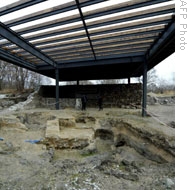-
(单词翻译:双击或拖选)
Nowadays, it's a sleepy hamlet nestled deep in the Georgian countryside. But Dmanisi wasn't always like this.
A walk up a steep hillside reveals some of its long hidden treasures. Dmanisi was once an important gateway2 for travelers and traders, and even our prehistoric3 ancestors found it a good place to stay.
 |
| People look at the site of an archeological dig in Dmanisi some 90 km outside Tbilisi, Georgia, 02 Jan 2008 |
Archeologist Jimsher Chkhrimiani has been working here for the past nine years and has uncovered some surprising secrets.
"In these layers of rock, we found remains that are older than 1.7 million years," he said. "We found at least five individuals. It's significant because these are the oldest human ancestors found outside of Africa."
The discovery of ancient human skeletons and largely intact skulls4 put Dmanisi on the archeological map.
David Lordkipanidze is General Director of the Georgian National Museum in Tbilisi. He says very primitive5 human ancestors are believed to have migrated from Africa, much earlier than previously6 thought, and they came through Georgia before traveling onward7.
"These finds are the missing link connecting Asia, Europe and Africa," said Lordkipanidze.
But nearly two million years ago was just the beginning for Dmanisi. It remained important throughout the Bronze Age and in medieval times, as the ruins of ramparts and watch towers on the hilltop can attest8.
Ancient migration9 routes turned into trade routes.
And for centuries, rulers from within those same walls controlled trade to and from China, Persia and Byzantium, and they collected customs duties for it all as archeologist Chkhrimiani explains.
"This was the intersection10 of two big routes," he said. "People used to call it 'the camel route,' which went south through the mountains through Armenia and the Middle East. The other route went to western Georgia, to Byzantium and to the sea. Dmanisi owed its success to the Silk Road."
Back then, archeologists say, Dmanisi was a multi-ethnic, multi-religious town of some 10,000 inhabitants - an important stop on the Silk Road.
Today, wealth lies in oil and gas. And again, Georgia is a major transit11 point.
Lawrence Sheets, senior Caucasus analyst12 for the International Crisis Group, says that is crucial for Georgia today. "These transit routes are very important because this is a small country of four million people," he said. "It's a largely agrarian13 economy, not an industrial economy and it relies very heavily on trade through Georgia [and trade in general].
Some say, Georgia's position between two continents - Europe and Asia - enhances its strategic importance, but also makes it vulnerable to big power rivalries14. One example - the brief war Georgia fought in August with neighboring Russia over the breakaway Georgian enclave of South Ossetia.
Georgians are well aware of their place in history, as a young woman is quick to point out. "Let me remind you that we are the first Europeans," she said. "We always looked westward15."
There is obvious pride that this was a crucial transit point for early humans over the vast Caucasus mountain range.
Paleoanthropologist David Lordkipanidze says it's part of Georgia's identity. "Georgia was always on the crossroads -- in prehistoric times, in historical times," he said. "If we look back on the archeological record, Georgia always had a place, the role of the connection [between] East-West. I'm sure Georgia will continue to play this role in the future too."
Back in Dmanisi, archeologists have uncovered a historical treasure trove16.
But for modern day Georgia, the question is how it will navigate17 its position as a crossroads to shape its future.
 收听单词发音
收听单词发音
1
remains

|
|
| n.剩余物,残留物;遗体,遗迹 | |
参考例句: |
|
|
|
2
gateway

|
|
| n.大门口,出入口,途径,方法 | |
参考例句: |
|
|
|
3
prehistoric

|
|
| adj.(有记载的)历史以前的,史前的,古老的 | |
参考例句: |
|
|
|
4
skulls

|
|
| 颅骨( skull的名词复数 ); 脑袋; 脑子; 脑瓜 | |
参考例句: |
|
|
|
5
primitive

|
|
| adj.原始的;简单的;n.原(始)人,原始事物 | |
参考例句: |
|
|
|
6
previously

|
|
| adv.以前,先前(地) | |
参考例句: |
|
|
|
7
onward

|
|
| adj.向前的,前进的;adv.向前,前进,在先 | |
参考例句: |
|
|
|
8
attest

|
|
| vt.证明,证实;表明 | |
参考例句: |
|
|
|
9
migration

|
|
| n.迁移,移居,(鸟类等的)迁徙 | |
参考例句: |
|
|
|
10
intersection

|
|
| n.交集,十字路口,交叉点;[计算机] 交集 | |
参考例句: |
|
|
|
11
transit

|
|
| n.经过,运输;vt.穿越,旋转;vi.越过 | |
参考例句: |
|
|
|
12
analyst

|
|
| n.分析家,化验员;心理分析学家 | |
参考例句: |
|
|
|
13
agrarian

|
|
| adj.土地的,农村的,农业的 | |
参考例句: |
|
|
|
14
rivalries

|
|
| n.敌对,竞争,对抗( rivalry的名词复数 ) | |
参考例句: |
|
|
|
15
westward

|
|
| n.西方,西部;adj.西方的,向西的;adv.向西 | |
参考例句: |
|
|
|
16
trove

|
|
| n.被发现的东西,收藏的东西 | |
参考例句: |
|
|
|
17
navigate

|
|
| v.航行,飞行;导航,领航 | |
参考例句: |
|
|
|















